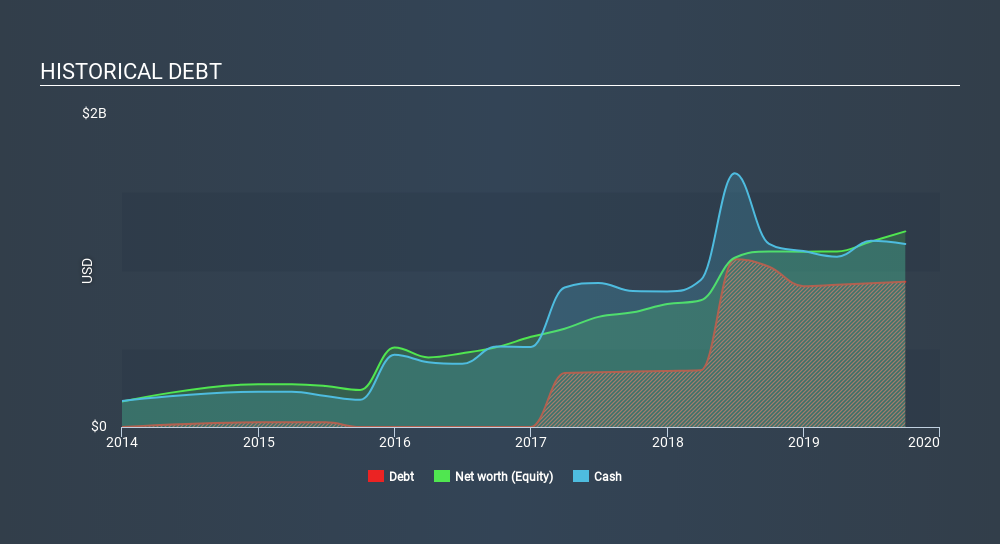
Legendary fund manager Li Lu (who Charlie Munger backed) once said, 'The biggest investment risk is not the volatility of prices, but whether you will suffer a permanent loss of capital. It's only natural to consider a company's balance sheet when you examine how risky it is, since debt is often involved when a business collapses. As with many other companies Square, Inc. (NYSE:SQ) makes use of debt. But should shareholders be worried about its use of debt?
Why Does Debt Bring Risk?
Debt and other liabilities become risky for a business when it cannot easily fulfill those obligations, either with free cash flow or by raising capital at an attractive price. Ultimately, if the company can't fulfill its legal obligations to repay debt, shareholders could walk away with nothing. However, a more common (but still painful) scenario is that it has to raise new equity capital at a low price, thus permanently diluting shareholders. Of course, the upside of debt is that it often represents cheap capital, especially when it replaces dilution in a company with the ability to reinvest at high rates of return. When we examine debt levels, we first consider both cash and debt levels, together.
Check out our latest analysis for Square
How Much Debt Does Square Carry?
As you can see below, Square had US$928.9m of debt at September 2019, down from US$1.02b a year prior. But on the other hand it also has US$1.17b in cash, leading to a US$240.8m net cash position.

How Strong Is Square's Balance Sheet?
The latest balance sheet data shows that Square had liabilities of US$1.64b due within a year, and liabilities of US$1.11b falling due after that. On the other hand, it had cash of US$1.17b and US$665.7m worth of receivables due within a year. So its liabilities outweigh the sum of its cash and (near-term) receivables by US$915.3m.
Given Square has a humongous market capitalization of US$32.1b, it's hard to believe these liabilities pose much threat. Having said that, it's clear that we should continue to monitor its balance sheet, lest it change for the worse. While it does have liabilities worth noting, Square also has more cash than debt, so we're pretty confident it can manage its debt safely.
We also note that Square improved its EBIT from a last year's loss to a positive US$11m. There's no doubt that we learn most about debt from the balance sheet. But ultimately the future profitability of the business will decide if Square can strengthen its balance sheet over time. So if you want to see what the professionals think, you might find this free report on analyst profit forecasts to be interesting.
Finally, a business needs free cash flow to pay off debt; accounting profits just don't cut it. While Square has net cash on its balance sheet, it's still worth taking a look at its ability to convert earnings before interest and tax (EBIT) to free cash flow, to help us understand how quickly it is building (or eroding) that cash balance. Over the last year, Square actually produced more free cash flow than EBIT. There's nothing better than incoming cash when it comes to staying in your lenders' good graces.
Summing up
While it is always sensible to look at a company's total liabilities, it is very reassuring that Square has US$240.8m in net cash. The cherry on top was that in converted 4729% of that EBIT to free cash flow, bringing in US$511m. So we are not troubled with Square's debt use. When analysing debt levels, the balance sheet is the obvious place to start. However, not all investment risk resides within the balance sheet - far from it. Be aware that Square is showing 1 warning sign in our investment analysis , you should know about...
At the end of the day, it's often better to focus on companies that are free from net debt. You can access our special list of such companies (all with a track record of profit growth). It's free.
If you spot an error that warrants correction, please contact the editor at editorial-team@simplywallst.com. This article by Simply Wall St is general in nature. It does not constitute a recommendation to buy or sell any stock, and does not take account of your objectives, or your financial situation. Simply Wall St has no position in the stocks mentioned.
We aim to bring you long-term focused research analysis driven by fundamental data. Note that our analysis may not factor in the latest price-sensitive company announcements or qualitative material. Thank you for reading.
About NYSE:XYZ
Block
Block, Inc., together with its subsidiaries, builds ecosystems focused on commerce and financial products and services in the United States and internationally.
Flawless balance sheet with solid track record.
Similar Companies
Market Insights
Community Narratives





